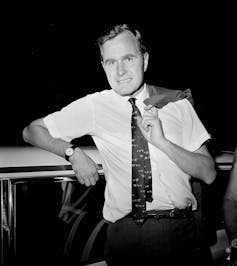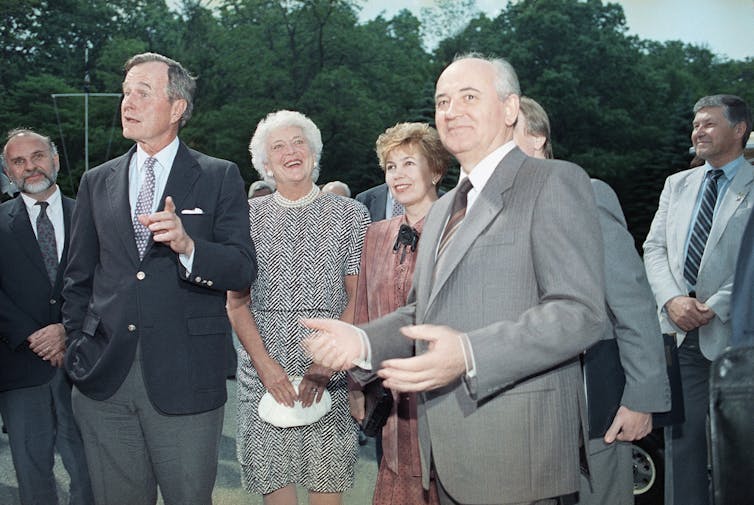Why we'll miss George H.W. Bush, America's last foreign policy president
- Written by James Goldgeier, Professor at the School of International Service and Visiting Senior Fellow, Council on Foreign Relations, American University School of International Service
There are many reasons to miss George H.W. Bush, the 41st president of the United States. A World War II hero, he later served his country with great distinction in a number of important positions before becoming vice president and then president.
The outpouring of warm feelings[1] first for his wife, Barbara Bush, who passed away earlier this year[2], and now for him, reflects not only the role President and Mrs. Bush played in American history but also the decency they represented in a political system that now has become full of indecency.
Strikingly, George H.W. Bush was also the last person elected president of the United States with any prior foreign policy experience.
 George H.W. Bush as a senate candidate in 1964.
AP Photo/Ed Kolenovsky
George H.W. Bush as a senate candidate in 1964.
AP Photo/Ed Kolenovsky
He entered office with one of the most impressive resumes of any president, having served as director of the Central Intelligence Agency, ambassador to the United Nations and Ronald Reagan’s vice president.
He left office with an impressive list of achievements, including the unification of Germany within NATO. As historian Jeffrey Engel has reminded us in his excellent recent book, “When the World Seemed New,[3]” this was far from assured. British Prime Minister Margaret Thatcher and French President Francois Mitterand were deeply opposed to Germany’s unification, while Soviet leader Mikhail Gorbachev opposed not only unification but the incorporation of the former East Germany into NATO. Germany’s leadership in Europe as a force for democracy and human rights since those years has clearly vindicated President Bush’s instincts to support West German Chancellor Helmut Kohl in his efforts in 1990.
A major high point of the George H.W. Bush presidency, however, was also the harbinger of disappointments to come: the swift military victory that reversed Saddam Hussein’s invasion of Kuwait and seemed to herald a new era in world affairs – but left Saddam Hussein in power.
In 1991, it seemed America could do anything it wanted to in the world – politically, diplomatically and militarily. But no one could have imagined 27 years ago the role that Iraq would come to play in American foreign policy in the ensuing years and the loss of American lives, money, standing and self-confidence that resulted from U.S. involvement in that country.
A new world order?
 Bush with Soviet President Mikhail Gorbachev at Camp David on June 2, 1990.
AP Photo/Marcy Nighswander
Bush with Soviet President Mikhail Gorbachev at Camp David on June 2, 1990.
AP Photo/Marcy Nighswander
A month after Iraq’s invasion of Kuwait, in September 1990, Bush and Gorbachev issued a joint statement noting that[4] “no peaceful international order is possible if larger states can devour their smaller neighbors.” That same month, Bush declared[5], “We’re now in sight of a United Nations that performs as envisioned by its founders.”
The problem was that while the United Nations was set up to prevent powerful states from invading weaker neighbors, as Germany and Japan had done in the 1930s and 1940s, the main challenges of the post-Cold War world – prior to Russia invading Ukraine in 2014 – were different. They were mainly internal challenges: failed states and civil wars in places like Somalia, Rwanda, the Balkans, Afghanistan and eventually Iraq after the disastrous U.S. occupation following the 2003 war.
The U.S. effort to put together an international coalition against Iraq in 1990 was stunning. Secretary of State James Baker met with every head of state or foreign minister whose country held a seat on the U.N. Security Council. That meant not just meeting with those countries that had permanent seats like the Soviet Union and China, but also those holding rotating seats such as Ivory Coast, Romania and even Cuba.
Baker’s efforts were successful. The Security Council passed U.N. Resolution 678[6] on Nov. 29, 1990 and established Jan. 15, 1991 as the deadline for Iraq to withdraw its troops from Kuwait or face a U.S.-led international coalition to force its withdrawal.
The coalition made good on the threat. As Colin Powell told my co-author Derek Chollet and me in an interview for our book on the period[7], “The Gulf War was the war against the Russians we didn’t have. There were no trees and no hills, but that’s what we were trained to fight. The Iraqis sat there and we kicked the shit out of them.”
For those who had suffered through the morass of Vietnam and the crisis of American confidence that followed, it was the ultimate feel-good moment. An estimated 800,000 people packed the National Mall to cheer their military heroes. Bush came out of the war with a 90 percent public approval rating[8].
The Iraq problem
And yet, the following year, a candidate with no foreign policy experience who had avoided military service in Vietnam won the presidency. By 1992, the Cold War was over, and Bill Clinton campaigned with the mindset that it was “the economy, stupid[9].”
But while Clinton defeated Bush, he inherited the Iraq problem from his predecessor, who had chosen not to remove Saddam Hussein in order to keep his U.N. coalition together. Clinton was faced for eight years with patrolling the no-fly zones established over the north and south of Iraq to protect the Kurdish and Shiite populations.
Clinton passed the Iraq problem off to George W. Bush, who in the aftermath of the attacks of Sept. 11 made the fateful decision to go to war in 2003 – this time without U.N. authorization. Bush and his “coalition of the willing” removed Saddam Hussein, leaving the United States as an occupying power. And while Barack Obama promised[10] – a promise on which, for a fleeting moment, he seemed to deliver[11] – a U.S. withdrawal from the country, he was forced to go back in militarily with the rise of the Islamic State, handing off the Iraq problem to his successor to manage. Even as Donald Trump presided over tremendous military success against ISIS, Iraq remains a diplomatic and military challenge for the United States. The 2003 war left Iran ascendant in the region, and it cost the United States not only significant blood and treasure, but so much of the standing and legitimacy it gained in 1991.
Thus the promise of the Gulf War – the U.S. dominant like no other since ancient Rome, confident that it could rule the world on behalf of freedom and democracy – gave way over time to doubt and confusion. In the post-Cold War world, the U.S. military was largely called upon to handle internal conflicts – in Somalia, Bosnia, Kosovo, Afghanistan, Libya and, throughout it all, Iraq – and the results have proved deeply dissatisfying.
In 1991, George H.W. Bush declared victory and celebrated with a parade. In 2011, there was no parade for Libya. There will be no parade for Afghanistan. If Donald Trump ever holds a military parade in Washington, D.C. as he once discussed, it will take place in an America exhausted from its long wars and feeling far less confident in its role in the world than it was back in the George H.W. Bush years.
It’s fitting that George H.W. Bush, World War II military hero and Cold War veteran, is the last president to preside over what at the time felt awesome: a major military victory fought on behalf of the entire world against a dictator.
His successors, none of whom served in the military and all of whom have wrestled with post-Cold War challenges, have been vexed not only by Iraq, but by challenges posed by nonstate actors while trying to manage regional threats emanating from China, Russia and Iran. While Bill Clinton, George W. Bush, Barack Obama and now Donald Trump have each in their own way tried to define American leadership, George H.W. Bush’s presidency represents the moment at the end of the Cold War when anything seemed possible for the United States in world affairs, and the underlying challenges were only just beginning to become visible.
Editor’s note: This story updates a version[12] published on June 12, 2017.
References
- ^ warm feelings (www.nytimes.com)
- ^ who passed away earlier this year (www.vanityfair.com)
- ^ When the World Seemed New, (www.smu.edu)
- ^ a joint statement noting that (www.presidency.ucsb.edu)
- ^ Bush declared (www.washingtonpost.com)
- ^ Resolution 678 (documents-dds-ny.un.org)
- ^ an interview for our book on the period (www.worldcat.org)
- ^ 90 percent public approval rating (www.politifact.com)
- ^ the economy, stupid (www.nytimes.com)
- ^ Barack Obama promised (www.politifact.com)
- ^ he seemed to deliver (www.cbsnews.com)
- ^ updates a version (theconversation.com)
Authors: James Goldgeier, Professor at the School of International Service and Visiting Senior Fellow, Council on Foreign Relations, American University School of International Service

